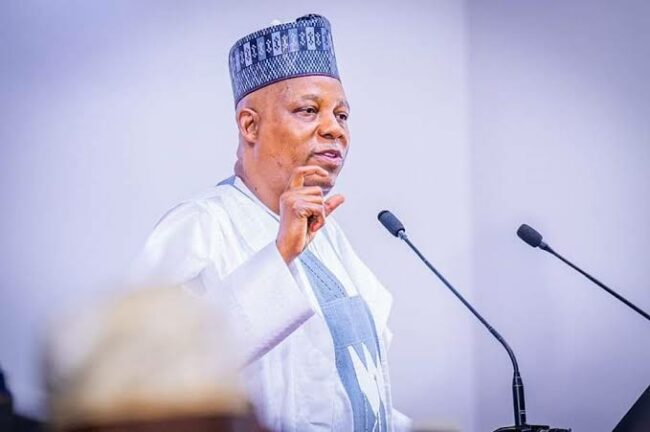The federal government has assured that it will integrate technology into the nation’s educational infrastructure to address human capacity and resource challenges, thereby improving learning outcomes.
Vice President Kashim Shettima provided this assurance on Wednesday during a meeting with the World Bank Nigeria team at the Presidential Villa in Abuja. He noted that President Tinubu is committed to driving change in the country.
He stated that, with the evolving global technological landscape, President Bola Ahmed Tinubu’s administration will harness all available opportunities to add value to the nation.
“Rest assured that where there is a will, there is always a way. Change is a very painful process, but I know we will overcome this and move towards sustained growth,” he said.
Shettima referenced India’s success with KYAN smart class solutions for teaching students in rural areas, suggesting that similar innovations could revolutionize Nigeria’s education system.
“In India, Kyan technology is used to teach 50,000 pupils in rural and impoverished areas. I believe technology will significantly upgrade our education system,” he noted.
The Vice President called for a holistic approach to education reform, including improvements in infrastructure, teacher training, and technology implementation.
“We need a comprehensive plan to address the gaps in our education system as quickly as possible. We must not allow these challenges to persist. The federal government is committed to making the necessary changes, but we need the cooperation of all stakeholders, including state governors, to drive this transformation forward,” VP Shettima said.
Earlier, during their presentation on Opportunities for Prosperity and Equity in Nigeria’s Human Capital, Dr. Ndiamé Diop, World Bank’s Country Director for Nigeria and leader of the team, outlined their focus on improving governance, health, and education across the 36 states of the federation and the Federal Capital Territory (FCT).
The projects, HOPE – Governance, HOPE Primary Health Care, and HOPE Basic Education, are part of a broader initiative to reform governance processes, primary healthcare, and education, with an emphasis on human capital development.
“We are working to reinvigorate governance, primary healthcare, and education facilities across the country,” Diop said.
ALSO READ: Edo Guber: Why PDP may boycott peace accord signing
He added that all HOPE series operations are result-based financing programs, with results primarily focused at the sub-national levels.
One core component of the initiative is the use of technology to enhance service delivery in both healthcare and education.
Diop continued: “Digital health tools will be vital in managing patient records and ensuring follow-up care. We’re looking at leveraging AI and other technologies to streamline service delivery in underserved areas.
“The challenge is not just infrastructure but ensuring that skilled workers are in place to provide quality services. We need to reinvigorate our healthcare system and equip our teachers to ensure a better future for our children.”

